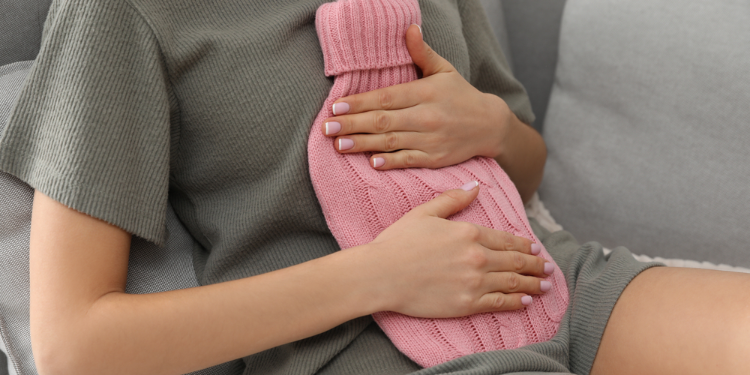
You're moving abroad and wondering how to handle your period. What is the situation in your host country, from purchasing pads to medical treatment? Is there freedom of speech on this matter? Learn more about dealing with menstruation in a foreign country through testimonies from expat women.
Dealing with menstruation in a foreign land
When you reached your host country several weeks ago, you noticed that your period hasn't started. Or maybe it has begun much earlier than expected. Rest assured: a slight change in the menstrual cycle can happen. However, if after some weeks, your period still doesn't arrive or it starts suddenly, it is probably a sign of secondary amenorrhea. Many women are unaware that long journeys and expatriation can disrupt the menstrual cycle.
That's how Maya, a Senegalese-born engineer who has been living in Switzerland for a year, found out about it. "I wasn't aware of secondary amenorrhea. In fact, I didn't even notice that my period wasn't coming. When you move overseas, you are initially busy with paperwork, etc. It was only a month later that I realized that I did not get my period. At first, I thought it was great, but then I started to worry". Sayu, a Japanese expat, was equally worried, as she recalls her first few months in France, just over 5 years ago. "At first, I had imaginary stomach pains. And then it came in abundance and irregularly, like never before!"
A change of country can disrupt your cycle
Relocation can affect the menstrual cycle due to several factors. Firstly, there are external changes: you find yourself in a new environment and with a new diet, etc. You have to adapt to jet lag, a new pace, and a new climate. Your body reacts to all these changes in a different way. Certain women don't feel any change in their menstrual cycle before and after moving abroad. However, others may experience irregularities that may not last as long.
Similarly, as your body reacts to a new life in a new country, you can also experience mood swings. You may feel stressed if everything doesn't go as planned. You may also experience cultural or emotional shock. All these emotions combined can also affect your menstrual cycle. You don't have to be an expat to realise that mood fluctuations can have an impact on your menstrual cycle.
Dealing with menstrual disruption as an expat
Moving overseas may affect your menstrual cycle, whether or not your period is painful, heavy, or irregular. Don't panic if the problems only last for a short time; everything will return to normal soon.
Mary, an American expat in Osaka, shares her experience. She explains that one night, she suddenly felt "a lot of pain in her lower back" during a menstrual cycle. "I moved to Japan to work in a network of shared houses. It happened one night in 2019, only a few months after I arrived". Mary says that until then, she had always had regular, fairly short, painless cycles, except for one "catastrophic" night. "All the pain went to my lower back. I couldn't lie down or sit up. I didn't know what to do.
Since Mary speaks and reads Japanese, she searched the Internet to find a night doctor or an on-call service. "With the pain, I couldn't understand anything. I'd even forgotten that I'd brought painkillers from home." After hesitating for a long time, Mary fell back on her painkillers and did not consult an emergency doctor. "I have to admit I was really scared to find out how much it was going to cost. I only had basic health insurance". The next day, Mary had almost no symptoms. "I had just a slight pain in her lower abdomen, in its normal position, and I never felt pain like that again. As a result, I didn't see a doctor."
How to deal with painful periods abroad
Although she didn't consult a doctor, Mary did go to a chemist to explain her symptoms. The professionals recommended several treatments, available without a prescription, "but expensive," in Mary's opinion. However, she tried one treatment, which she found to be effective.
As mentioned above, secondary amenorrhoea is generally benign, although it can cause minor side effects. But if the problem persists, it's best to consult a doctor who will be able to assess whether dysmenorrhoea (pain during your periods) can be treated with standard therapies (non-steroidal anti-inflammatory drugs, which are not recommended if you suffer from certain medical conditions), or whether there is another cause for your pain. If this is the case, your doctor can carry out additional tests.
It is recommended that you get medical treatment as soon as possible and not wait until the pain has set in. If you are used to treatment with herbal products, talk to your doctor to avoid a possible "cocktail" effect. Whatever your medical treatment, do not exceed the prescribed doses.
Maya explains that there are various simple ways of easing the pain. However, their effectiveness can vary from one woman to another; for example, herbal teas (to be taken as soon as possible), hot water bottles applied to the stomach, belly messages, walking at a slow pace, etc.
The taboo around menstruation
In its 2021 report, Plan International, an international solidarity NGO, pointed out that menstruation is still stigmatized throughout the world. Yet, this concerns 300 million girls and women every day. It's worth noting that 500 million of them do not have access to necessary sanitary products. Moreover, 2 women out of 5 miss school or work because of their period. These days of absence turn into weeks and months spread over years. Ultimately, girls' schooling and women's jobs are at risk.
The very mention of menstruation is taboo in many countries. Women are victims of sexism and prejudice. Menstruation is still considered "dirty", although it is a natural condition for women. Plan International refers to the impact of culture in particular Indian, Nepalese and Ghanaian communities, which require women who menstruate to sleep elsewhere or not to be seen in public.
Every year, on the occasion of International Menstrual Hygiene Day (28 May), the NGO seizes the opportunity to break down taboos and remind people of current programs. In Togo, for example, the Parec program raises awareness among adults, parents, girls, and boys. The aim is to get rid of misconceptions and taboos about menstruation and to highlight what we want to keep hidden. The silence around menstruation has other harmful consequences for girls and women, such as inadequate access to sanitary products and being forced to manage with whatever they have (paper, cloth, etc.), which is dangerous for their health.
The prohibitive cost of sanitary products
Expatriate and non-expatriate women alike say they feel embarrassed about their periods. "I don't like it when people say 'ragnagna'," explains Sayu, "it doesn't mean anything. You have to call things by their name". In the United States, women feel ashamed to talk about their periods. In their view, the subject is not given enough attention in the United States. But the backlash against abortion rights has led them to fear other measures of the same kind. Conservative politicians are already fighting to ban all instruction on menstruation.
In Germany, it wasn't until 2020 that sanitary products were no longer subject to a 19.6% tax, which has now been reduced to a more decent rate of 7%. However, this is still higher than in France, where a 5.5% tax rate applies. While it is only 4% in Spain, it is higher in Finland (24%), Denmark (25%) and Hungary (27%). On the other hand, Kenya, Canada, Ireland, Jamaica, and the United Kingdom have abolished taxes on menstrual sanitary products.
Menstruation: Expats note positive changes
"I have the impression that things are changing", concludes Maya. "Spain has introduced menstrual leave for painful periods. Not everyone agrees with that, but at least we're talking about it openly." NGOs and associations are working to change the way people look at menstruation.
Things are also changing in practice, with more control on sanitary products. Disposable options are criticized for being harmful to health and the planet. The "traditional way" has been trending for some years. Menstrual panties and cups are winning over a growing number of women. For expatriate women, taking washable panties, menstrual cups and sanitary towels with you can help when conventional solutions are not available. As well as being environmentally friendly, these products are also economical. Taking your medicines with you is also advisable to prevent any painful episodes.
NGOs and associations believe that breaking the taboo around menstruation also means developing practical, low-cost sanitary products for women, talking about menstruation without hesitation, and educating girls and boys from an early age.



















